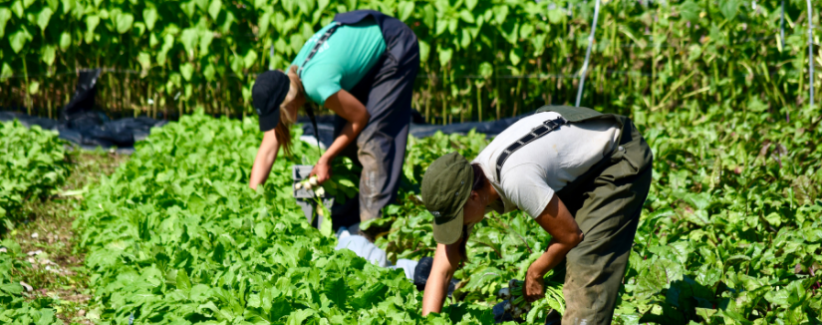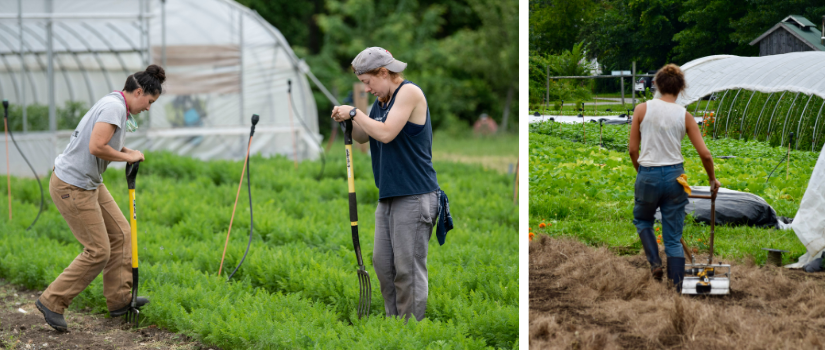Women Who Farm: The Joys—and Challenges—of Farming as a Woman

Last month, we shared some of the insights and experiences of the incredible women who make up our 2021 farm team. It has been a delight to have such a thoughtful, dedicated, and skilled group of farmers with us at Gaining Ground this growing season.
Women farmers can face gender-specific barriers as they navigate their career paths, and we are grateful to have the opportunity to hear from our team first-hand about how this has affected them and their work.
Please enjoy Part Two of this series below. You can read Part One of the series here.
On the differences for women in agriculture
Kim Schmidt
There can still be an assumption that it’s a man’s field, and so I think there is a lot of surprise when women go into farming, even though for the last 10 years or so there have been a lot of women entering the field.
There are a lot of challenges: Tools being built for specific-size bodies that aren’t women; tractors being built so that they won’t turn on unless the driver is a certain weight; hand tools not fitting; literature often written with the assumption that if you’re a woman then you’re doing flowers or very specific jobs on the farm; farms training the men first on heavy equipment and not spending enough time with women on heavy equipment—not helping them adjust it to work for their body or their style.
Just this past spring someone asked me, What does one call a female farm manager? That threw me for a loop.
—Farm Manager Anna Kelchlin
Chrissie Edgeworth
Through the various outdoors and physical labor work that I’ve done, people will oftentimes defer to my male counterparts with questions or when looking for answers or leadership before talking to me. Our strength and ability to do certain tasks has been doubted because there are no men around. People will oftentimes refer to me as a gardener and ask about my garden, whereas my reality is as a farmer on an actual farm.
Beyond being unnecessarily aware of my gender in my work, I’m also acutely aware of my privilege in this position. I am a young white woman who makes a liveable wage, whereas 73 percent of agriculture workers in the United States today are immigrants, half of whom are undocumented and not protected under fair labor laws.

Erin Espinosa
The roles are different that women and men are expected to play in farming—men are in the field and on the tractor, while women are at the markets and farm stands. These roles do play out this way sometimes, but in my experience all of these roles can be shared by anyone. When living in North Carolina, I was laughed at for applying to be on field crew and it was suggested that I apply for the farm stand associate position. Customers at my previous job in central Massachusetts raised their eyebrows when they learned that I took part in growing the vegetables that I was selling at the farmer’s market.
Tools and equipment are designed for men, with big hands and a taller waist line, so I constantly have an adjustable wrench, pliers, and vice grips nearby to give me some artificial hand strength.
A challenge that is not current, but is on my mind quite a bit, is managing pregnancy while farming. I know many who have done it but it was certainly challenging for them. For those of us women farmers who do want children, I worry about affording the time off to both be pregnant and nurse a baby. Small-scale farmers often do not get much paid time off, let alone health insurance benefits or maternity leave. These limitations make an already difficult time in a woman’s life even more challenging.
Anna Kelchlin
The main difference I see is that women in agriculture are more collaborative and supportive of the team. I actually have limited experience working with men on farms since the two farms I have worked on were mostly women.
A challenge I face is how society has shaped my consciousness into thinking that I am not capable. I struggle with living in a patriarchal system that values hierarchy and perfection. I struggle with needing brute strength for things such as lifting and turning the two-wheel BCS tractor. I struggle with how tools, tractors, and equipment are designed for men.
And then there are the comments and looks I receive as a female farm manager. Just this past spring someone asked me, What does one call a female farm manager? That threw me for a loop.
Rae Axner
On a daily basis, the times when I feel most aware of my gender are the times when I feel most aware of my height. Although anyone of any gender can be any height, so much design is based on the stereotypical cisgender man’s body. When I’m using tools or working at countertops that are designed for taller people, I’m reminded that I do not have the “typical” identity or physical stature of those in my occupation.
I’m also reminded of times when men have visited predominantly women-run farms I’ve worked on, and made assumptions about who is or isn’t in charge. We often think that those types of attitudes are outdated, but of course they are still pervasive regardless of whether or not these individuals know that biases are impacting their actions.

Avery Indermaur
Honestly, I feel like I have been spoiled in my farming experience because of the all-female crew. Aside from a few comments from volunteers, I generally don’t notice any external reminders that being a female farmer isn’t the norm. Of course, I came into the role with prior knowledge of farming as a male-dominated industry, but it just makes me prouder to see all that we accomplish on the farm and how we are slowly breaking those molds.
On being a part of an all-woman farm team
Erin Espinosa
Working with an all-woman farm team is liberating in ways that I didn’t anticipate. When working with a mixed crew or mostly men, there is this constant pressure to perform well. Most of this pressure is internal—a product of years of the suppression of women in the workplace, especially in manual labor industries. In reality, most of the men I’ve worked with are non-judgemental and supportive; but the bad eggs and the comments from customers stick with you.
I am no longer working under that pressure, and instead am working in the most mentally, physically, and emotionally supportive environment I have ever experienced. I freely share opinions and ideas because the fear of being wrong and misrepresenting women is no longer there. I try tools and equipment that I have shied away from in the past because the fear of failing and poorly representing women is no longer there.
There are “trivial” differences as well. Reproductive health is hard to maintain on a farm. Summers are hot and we are sweaty. Menstruation doesn’t take a summer break. And on this team we can all relate and directly feel the impact of these realities. For this reason, we can all be understanding when needing extra bathroom breaks to manage our health more closely.

Anna Kelchlin
It has been an empowering, positive experience. There is a collaborative and supportive nature to our team that allows for open dialogue and communication. For me it’s been grounding, fun, and exciting to show how we can be caregivers of this land and that we can work in community.
Avery Indermaur
The Gaining Ground team this year has been unbelievably supportive, nurturing, and welcoming—a true family. I think that having the all-female dynamic has made it easier to bond with everyone on a deeper level and create a very open space. We have had so many great conversations about everything from our favorite lunches to relationship troubles to pressing world issues and don’t have to deal with the competition that comes with doing physical work around men. Also, Gaining Ground is by far the cleanest and most organized farm I’ve ever been on, which I can almost solely attribute to the all-woman crew. 😉
Chrissie Edgeworth
I love looking around and seeing my team kicking butt. I’m lucky enough to work alongside women who push themselves day in and day out. Who lead with transparency, courage, curiosity, intentionality, and heart. Who possess so much physical and mental strength. Who look out for one another and are mission-driven. Who bring brains and grit to the farm. And who bring years upon years of growing experience to their jobs every day with a willingness to always continue learning.
I hope that the gender binary continues to unravel and that young girls and non-binary kids can dream up a future where they can proudly be anything they want to be without a doubt in their minds. This season I’m incredibly grateful for the wisdom, strength, and empowerment that has come from being on an all-woman farm team.

Rae Axner
I have been lucky enough to work on several woman-led farming teams. Most of the time this is incredibly affirming—it contradicts the false internalized messages that women aren’t capable of doing the demanding work of running and maintaining a complex growing operation. Working on an all-woman farm team this season has allowed me to gain more confidence as a farmer and problem-solver. Pushing through any self-doubt I have about my physical abilities and witnessing my managers and coworkers doing the same is freeing, and it allows me to deepen and broaden my skills.
I am also in complete awe of the three managers at Gaining Ground—Anna, Kim, and Erin. All three of these women are still young but have been farming for close to or more than ten years. Their stamina, expertise, and strength is incredibly inspiring. They are able to balance being very rigorous and driven in completing the work with being very supportive of those of us who are newer to farming, and prioritizing our learning of the craft while working alongside them.
Kim Schmidt
It feels like everyone has a stake in the farm not just because it’s their job but because we care about the work and our opinions have value and weight. That’s something that I’ve noticed and appreciated. I’ve also appreciated the freedom to simply express how things are. Whether it’s how you’re experiencing your body—without having to be aware of how you and it are being perceived—or that you simply need help doing something. Because we understand the shortcomings of some of our tools, we’re more willing to ask for help when we need it.
I don’t know if it’s because we’re an all-woman crew or if it’s just the nature of farming and using tools that weren’t really built for our bodies, but I’ve really enjoyed the collaboration-heavy bent of the crew and the farm this year.
Photo credit: Tony Rinaldo Photography LLC